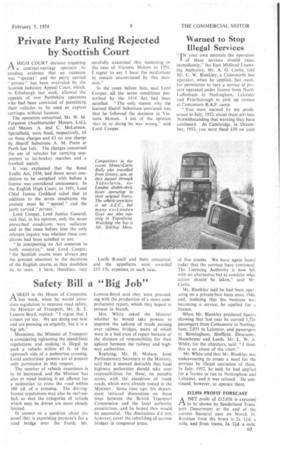Private Party Ruling Rejected by Scottish Court
Page 43

If you've noticed an error in this article please click here to report it so we can fix it.
A HIGH COURT decision requiring 1-1 a contract-carriage operator to produce evidence that an occasion was " special" and the party carried " private" has been overruled by the Scottish Judiciary Appeal Court, which, in Edinburgh last week, allowed the appeals of two Perthshire operators who had been convicted of permitting their vehicles to be used as express carriages without licences.
The operators concerned, Mr. W. M. Ferguson (Auchterarder Motors, Ltd.), and Messrs. A. and C. McLennan, Spittalfield, were fined, respectively, £4 on three charges and £3 on one charge by Sheriff Substitute A. M. Prain at Perth last July. The charges concerned the use of vehicles for carrying supporters to ice-hockey matches and a football match.
It was explained that the Road Traffic Act, 1934, laid down seven conditions to be complied with before a licence was considered unnecessary. In the English High Court, in 1951, Lord Chief Justice Goddard ruled that in addition to the seven conditions the journey must he " special " and the party carried "private."
Lord Cooper, Lord Justice General, said that, in his opinion, only the seven prescribed conditions were sufficient and in the cases before him the only relevant inquiry was whether these conditions had been satisfied or not. •
"In interpreting an Act common to both countries," said Lord Cooper, "the Scottish courts must always pay the greatest attention to the decisions of the English courts, as they doubtless do to ours. I have, therefore, very carefully examined this reasoning in the ease of Victoria Motors in 1951. I regret to say I have the misfortune to remain unconvinced by this decision."
In the cases before him, said Lord Cooper, all the seven conditions prescribed by the 1934 Act had been satisfied. "The only reason why the learned Sheriff Substitute convicted was that he followed the decision in Victoria Motors. I am of the opinion that in so doing he was wrong," said Lord Cooper.








































































































